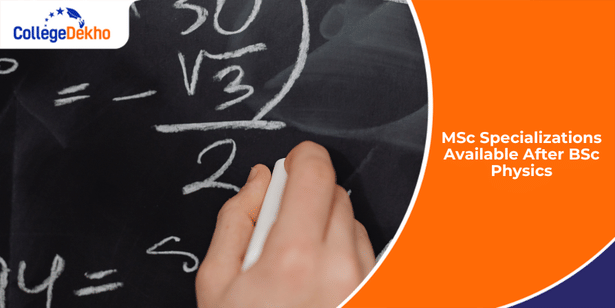
So, you've completed your BSc in Physics. Wondering what's next? The MSc specializations in physics are immensely diversified and take you onto an entirely different career path with each. Some might take you into space, others into a hospital with medical imaging, while others take you into laboratories working with really tiny materials or focusing on clean energy. Each field has its own demands in terms of skills and interests.
MSc Specializations Available After BSc Physics
Check here the MSc specializations available for you after completing BSc Physics degree:
MSc Specialisation | What It Offers / Focus Area | Skills You Need |
|---|---|---|
Applied Physics | This course focuses on using the principles of physics in real-life technology and industrial work. You learn how to design and test instruments, sensors, and devices used in electronics, communication, and industry. It connects theory with practical applications. | Strong basics in mechanics, electromagnetism, and electronics; good at maths; problem-solving ability; interest in experiments and real-world problem application; basic computer or programming skills. |
Nanotechnology / Materials Science | You study materials at the atomic and molecular level to understand their properties and build new materials for technology, medicine, or energy. It is a mix of physics, chemistry, and engineering. | Good understanding of quantum and solid-state physics; careful lab skills; patience for detailed work; curiosity about how small structures affect big properties; interest in microscopy and materials testing. |
Astrophysics / Astronomy / Planetary Science | This branch is all about space, stars, galaxies, black holes, and planets. You learn how the universe works and how scientists collect and analyze data from telescopes and satellites. | Strong in maths and theoretical physics; good at data handling; computer and programming knowledge (like Python); logical thinking; love for space and patience for research. |
Medical Physics | You apply physics to medicine by understanding how X-rays, MRI, CT scans, and radiation therapy work. You study radiation safety, imaging techniques, and hospital-based technology. | Solid knowledge of radiation physics and electronics; careful and precise in lab work; interest in healthcare; teamwork skills since you will work with doctors and engineers; sense of responsibility and ethics. |
Nuclear / Particle Physics | Focuses on the structure of atoms and sub-atomic particles. You learn about forces, radiation, and high-energy physics used in reactors and research labs. | Deep understanding of quantum mechanics and nuclear physics; strong maths; patience for long research projects; analytical mind; ability to use simulations or programming. |
Geophysics / Atmospheric Science | This specialisation studies the Earth and atmosphere using physics, including earthquakes, weather, climate, and oceans. It is useful in research, oil and gas, and environmental work. | Knowledge of mechanics and thermodynamics; field and lab data skills; statistical and computing ability; curiosity about Earth systems; teamwork and observation skills. |
Biophysics | You combine physics with biology to study how living systems work, such as how cells move, how the heart beats, or how molecules interact. It is great if you enjoy both science and life-based studies. | Strong in physics and willing to learn biology; good lab skills; data analysis ability; logical thinking; patience for experiments; curiosity about life processes. |
Optical Physics / Photonics | You study light and its applications, including lasers, fiber optics, imaging systems, and optical communication. It is widely used in defense, medicine, and telecom. | Strong grasp of wave and light physics; careful lab work; attention to detail; electronics knowledge; creativity for designing optical setups; computer skills. |
Renewable Energy Physics | You learn how physics can make energy cleaner and more efficient, such as solar, wind, or geothermal systems. It is an ideal field for sustainable development careers. | Basics of thermodynamics, electronics, and materials; problem-solving skills; research mindset; interest in environmental science and sustainability; teamwork. |
Acoustics / Vacuum Science (Niche Fields) | Acoustics focuses on sound and its uses in music, buildings, and medical fields. Vacuum science deals with ultra-low-pressure systems used in electronics and space research. | Knowledge of wave physics; precision and patience in experiments; data recording and analysis; interest in instruments and engineering setups; creativity. |
Since you now know each MSc specialization, pick the one that excites you the most. Think back to your BSc and contemplate the areas you enjoyed the most and what future industries you see yourself working in. Once you've decided, check out top MSc colleges in India for 2025 to find the best place to continue your physics journey.
















Similar Articles
NEST Exam 2026 Registration: Why This Timeline Matters for Science Aspirants
CUET Business Studies 2026: Preparation Tips, Scoring Topics, Weightage
CUET 2026 Computer Science: Preparation Tips, Scoring Topics, Weightage
CUET 2026 Knowledge Tradition Syllabus (Released): Check Topics, Pattern, Download PDF
Important Topics for CUET Teaching Aptitude 2026
Important Topics for CUET Psychology 2026